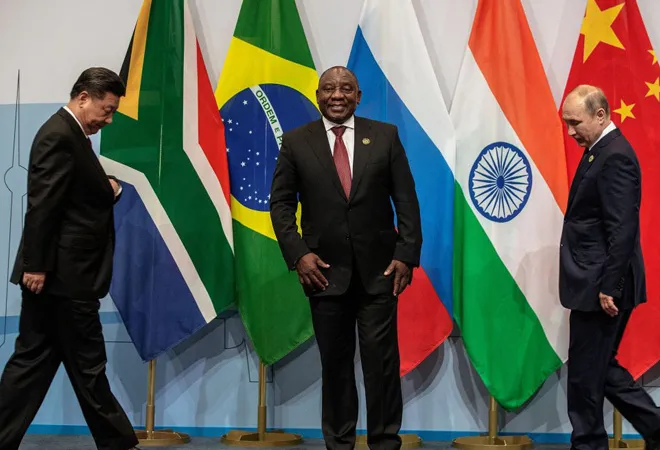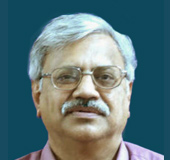-
CENTRES
Progammes & Centres
Location
Russia’s foreign policy underlines the significant role that both China and African countries will play

Russia began to get increasingly isolated from the Western world after the Russia-Ukraine conflict broke out in February 2022. This was largely because the Western world imposed unprecedented economic sanctions against it. The United States (US) and its European Union (EU) allies have extended full support to Ukraine in its bid to protect its sovereignty and territorial integrity. With Finland’s entry into the North Atlantic Treaty Organization (NATO) in April 2023 as a full-fledged member state, and continued support of the NATO powers to Ukraine, Russia is virtually facing a hostile power like the US at its doorstep. Consequently, Russia has opted to lean on China, the second strongest world power and the arch-rival of the US, to counter the US and its allies. Similarly, Russia is simultaneously cultivating ties with countries from the Global South. Russia not only has a notable presence in the politics of Central and West Asia but it is consistently befriending countries of the African continent as well. A continent with 54 UN member states and immense untapped resources, Africa provides sufficient room for Russia’s creeping expansionism. In view of this, it may be worthwhile to assess the growing significance of China, on the one hand, and the continent of Africa, on the other, in Russia’s foreign policy strategy.
Russia has opted to lean on China, the second strongest world power and the arch-rival of the US, to counter the US and its allies.
At this juncture, the convergence of strategic interests between Russia and China binds them in a close strategic partnership in the pursuit of challenging the US-led and the “rule-based” international order. Thus, if President Putin aims at reviving the glory of Russia by conquering Ukraine, China is keen on reintegrating Taiwan into the mainland by 2027. Both countries are dissatisfied with the existing world order and are challenging the US-led status quo. Their inevitable mutual dependence on this score plausibly can shape the contours of a new world order.
Asymmetric ties but shared perspectives
In essence, Sino-Russian ties are intrinsically asymmetric in nature because China’s economy is six times more powerful than Russia’s. After Russia annexed Crimea in 2014, thanks to the sanctions applied by the Western powers, Russia’s trade dependence on China began to increase. In the process, by 2022, China absorbed 30 percent of Russia’s exports while 40 percent of Russia’s imports came from China. China is gradually capturing Russia’s consumer market with its cheap products. Russia’s growing dependence on China is certainly advantageous from China’s standpoint. Such dependence can open up greater possibilities for China such as extracting concessional prices for gas and oil from Russia; persuading Russia to accept China’s naval presence in the Arctic; getting access to sensitive technologies from Russia; and ensuring entry into the resource-rich Central Asian states.
President Xi Jinping’s visit to Moscow from 20–22 March and the signing of a dozen bilateral agreements between China and Russia covering security, industry, science and technology, economy, and commerce also offered evidence of growing interdependence between the two countries. Just before Xi’s Moscow visit, China was instrumental in brokering peace between Iran and Saudi Arabia. Even though prospects of Russo-Ukrainian peace were discussed in Xi’s Moscow visit, the project of peace still appears elusive. Strangely, Xi’s visit came at a point when the International Criminal Court (ICC) had issued an arrest warrant against President Putin for illegally deporting Ukrainian children from Russian-occupied areas of Ukraine to Russia thereby violating their rights. Under these difficult circumstances, China has stood by Russia’s side.
After Russia annexed Crimea in 2014, thanks to the sanctions applied by the Western powers, Russia’s trade dependence on China began to increase.
Apart from forging a solid bond with China, Russia has also been working towards further consolidation of its presence in the Global South, especially in the continent of Africa. Once again, China’s presence in Africa is far too overwhelming compared to Russia’s, but both powers do have a common goal of minimising the influence of traditional neo-colonial/imperial Western powers in Africa. Therefore, they are concentrating on getting access to key strategic areas. While China has a military base in Djibouti, Russia is struggling to get a naval foothold in Sudan. Both countries have shown indifference to Western notions of liberal democracy and human rights while brazenly supporting autocratic regimes in Africa. Obviously, unlike the West, China happens to be a friend of Russia in Africa. Russia’s policy in Africa can be better appraised by taking cognisance of this shared Sino-Russian perspective in world politics in general, and in the regions of the Global South such as Africa in particular.
Russia’s expansionism in Africa
The Russo-African Summit in Sochi, Russia, in October, 2019 gave a clear manifestation of how Russia had made steady inroads into Africa. The summit was attended by all 54 African states and 43 serving heads of state. Russia signed 21 military cooperation agreements with different countries due to the summit. Besides, when the Russia-Ukraine conflict broke out, in the UN General Assembly meeting of March 2022, only 28 African states condemned the Russian invasion, which meant that almost half of the continent avoided making any categorical stand against Russia. Moreover, amidst the Ukraine conflict , President Putin has recently announced that Russia will give “priority” to its relationship with Africa. He assured the supply of cereals to the neediest African countries if the important agreement on Ukrainian exports is not reviewed in two months. Russia offered to provide aid in getting medicines, assured to promote cooperation in energy, and promised that it will double the quota of African students in Russian universities. President Putin also claimed that Russia wrote off African countries’ past debt worth US$ 20 billion in 2022 and stated that the trade between Russia and Africa in 2022 had reached US$ 18 billion. Besides, Russia has already started preparing for the second Russo-African Summit scheduled to be held in Petersburg from 26-29 July 2023.
In the realm of security, 49 percent of Africa’s military equipment, including major and small arms, come from Russia. Major African countries such as Algeria, Angola, Burkina Faso, Egypt, Ethiopia, Mali, Morocco, Rwanda, and Uganda import arms from Russia. Arms export by Russia is largely managed through a state-owned company called Rosoboronexport. Moreover, security is also provided by Russian Private Military Companies (PMC). Yevgeny Prigzhin, allegedly a close associate of Putin, has emerged as the oligarch who operates a transnational enterprise called the Wagner Group. Russia has utilised the services of Wagner in the Central African Republic (CAR), Ukraine, Sudan, Syria, and Libya. Furthermore, Prigzhin was sanctioned by the US for funding an Internet Research Agency that meddled in the US Presidential elections in 2016.
In the CAR, Prigzhin runs a conglomerate called Lobaye Invest that funds radio stations in the CAR and finances the training of army recruits by some 250 Russian mercenaries. Besides, Lobaye Invest has received generous concessions to explore gold and diamonds in the CAR. The Russians are interested in sustaining the shaky autocratic regime of President Tuadéra in the CAR. Hence, Russia is keen that the incumbent President Tuadéra gets more than two terms, which is beyond the prescribed limits of the present Constitution. Tuadéra removed the President of the Court, Danièle Darlan, by a decree because the latter allegedly was standing in his way for a third term. Like in the CAR, Russia has also interfered in the domestic politics of Guinea and Mali. The net result of Russian policy has been the erosion and eventual retreat of France from its erstwhile colonies like Guinea, Mali, and the CAR, an outcome most acceptable to Russia as well as China.
Russia is also involved in building a nuclear plant in Egypt.
Russia’s growing interest in extracting industries in Africa deserves a special mention. Russian companies including Gazprom, Lukoil, Rostec, and Rosatom (energy companies); Alrosa (diamond mining); and Rusal (bauxite mining) are already operating in Africa. In fact, Russian companies are involved in oil and gas industries in Algeria, Angola, Libya, Nigeria, Ghana, Ivory Coast, and Egypt. Russia enjoys substantial concessions in the CAR and the Democratic Republic of Congo (DRC) as far as gold, diamonds cobalt, coltan, etc. are concerned. Russian companies are extracting bauxite from Guinea, Chromite from Madagascar, gold and oil from Sudan, diamonds and platinum from South Africa, and diamonds from Angola and Zimbabwe. Russia is also involved in building a nuclear plant in Egypt. What is more, during the Ukraine conflict in 2022, Russia’s oil export was 214,000 barrels a day of refined petroleum products, which was three times higher than the previous year.
Conclusion
Owing to the Ukraine conflict and its isolation from the West, Russia’s dependence on China has been increasing. Although the relationship between the two countries is asymmetric, both the powers are engaged in challenging the US-led international order, albeit, with Russia as a junior partner. If China and Russia share dominant-dependent ties, in a hierarchical system of states, Russia, too, has been reproducing dominant-dependent ties with countries from Africa. At least in Africa, both China and Russia are co-existing by undermining the Western influence.
Rajen Harshé is a founder and former Vice Chancellor of the Central University of Allahabad, Prayagraj
The views expressed above belong to the author(s). ORF research and analyses now available on Telegram! Click here to access our curated content — blogs, longforms and interviews.

Rajen Harshé is a founder and former Vice Chancellor of the Central University of Allahabad Prayagraj and former President of the G.B. Pant Social Science ...
Read More +